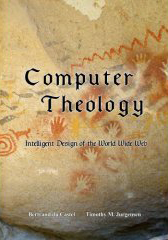PRESS
COMPUTER THEOLOGY |
||||
|
9 Mutation
Alice in Alice in Wonderland The
Uncertainty Principle of Faith
Predicting the end point or even
assessing the way stations of human evolutionary progression is something of a
religious exercise. It entails the search for trust through both causality and
process in an environment shaped by unknown concepts of social ecosystem
formation and interaction. It’s not that we don’t understand them. The point is
that we don’t have an appreciation of their possibility or their importance
until they arrive on our doorstep. As we noted back in our first chapter, such
was the situation the Incas found themselves in when the Spanish arrived. An
unknown social order, superior technology and devastating physiological
manifestations struck at the very basis in trust of the Inca Civilization. In
relatively short order, the central features of the civilization were
supplanted. When the entities contained within an
ecosystem can significantly shape the structure of the ecosystem itself, one is
at least two levels of indirection away from a stable platform from which to
assess, let alone to act. First, driven by stimuli derived from the human needs
hierarchy the social order seeks the means to sate the collective appetite.
This requires an evaluation of trust at the first level of indirection. Does
the collective societal stimulus point toward content that satisfies the
collective need? The second level of indirection is more subtle. It derives
from a characteristic fundamental to the physical ecosystem that was given
rigorous expression by Werner Heisenberg. Known as the Heisenberg Uncertainty Principle, this maxim suggests that we
cannot know exactly both the position and the momentum of a particle because
there is always at least a minimal level of uncertainty in the product of the
two. Thus, the act of measuring either momentum or position affects the level
of our understanding of the other. To exactly determine position we must
abrogate momentum. To exactly measure momentum we have to sacrifice position.
If we measure both simultaneously then there must be a degree of uncertainty in
the product of the two. Applied to social orders as examples of dynamic
systems, the corollary suggests that we cannot know exactly both the direction
of societal change (momentum) and the effective policy (position) of the social
order. Put more succinctly, when through our social systems we unleash the
technological engines of change, it is purely through an act of faith that we
attempt to assess where those engines will take us and, in fact, exactly where
we are at any point along the way. Such is the case with anticipating the future development of computer systems and their networks within the realm of human social orders. The social order impacts the network which in turn influences the social order. To illustrate this concept, let us consider the impact wrought from the |
||||
|
||||
© Midori Press, LLC, 2008. All rights reserved for all countries. (Inquiries) The contents of ComputerTheology: Intelligent Design of the World Wide Web are presented for the sole purpose of on-line reading to allow the reader to determine whether to purchase the book. Reproduction and other derivative works are expressly forbidden without the written consent of Midori Press. Legal deposit with the US Library of Congress 1-33735636, 2007.
|
ComputerTheology Intelligent Design of the World Wide Web Bertrand du Castel and Timothy M. Jurgensen Midori Press, Austin Texas 1st Edition 2008 (468 pp) ISBN 0-9801821-1-5 |
Book available at Midori Press (regular) |
